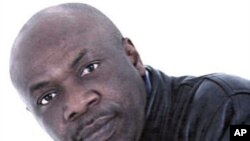Authorities in Nigeria say the main suspect in the bombing deaths of 12 people during last Friday's independence day celebrations is former Niger Delta militant Henry Okah.
Individual action
Nigerian security services say there is a clear difference between Henry Okah's individual actions and the group to which he once belonged - the Movement for the Emancipation of the Niger Delta.
State Security Services spokeswoman Marilyn Ogar says nine suspects under arrest are associated with Okah, not the broader MEND movement. "It think we all have to be careful. I have mentioned here that we have arrested nine suspects who have direct links to Henry Okah. I never mentioned MEND. I never mentioned an organization. I said to the incident and some unscrupulous prominent Nigerians," Ogar said.
Denies involvement
Okah is in a South African jail, charged with conspiracy to commit a terrorist act in connection with last Friday's bombing in Abuja. Okah lawyer Peter Krause denies his client's involvement in the attack and has asked to see the affidavit that led to his arrest, saying he doubts it came from Nigerian authorities.
"Mr. Okah obviously expects the entire arrest and his prosecution in South Africa to be initiated by the Nigerian authorities," Krause said. "But we do not suspect at this stage that the affidavits upon which the arrest warrant and the search and seizure warrants were obtained emanated from Nigeria."
Okah was released from Nigerian custody just last year as part of a Niger Delta amnesty program. So how did he get to be the main suspect in the independence day bombing?
Conflict with MEND leadership
Niger Delta student leader Chris Onodjacha is the National Association of Nigerian Students president. He says the problems between Okah and MEND began when Okah refused to accept last year's amnesty.
"Others who accepted the amnesty, they were shown on electronic media. But in the case of Henry Okah, there was nothing like that," Onodjacha said. "Since he did not accept the amnesty, the contents of the amnesty would not have an affect on him because he did not append his signature."
Onodjacha says Okah was determined to continue to fight the federal government against the wishes of MEND leaders, most of whom accepted the amnesty. "If a man is not to be pursuing the beliefs and ideologies of a particular body, those who are in the body of course can get up to say, no, these are not our ideologies, these are not our beliefs. These are not part of our modus operandi. We therefore see this person as a non-member," he said. "I think this is what has happened in the case of the MEND leaders and Henry Okah."
Because of that falling out with Okah, MEND commander Asari Dokubo says Friday's bombing should not be associated with the people of the Niger Delta. "I want to say that the action that took place is despicable. It is heinous. And it is condemnable," he said. "We the people represented by all the people of Niger Delta we have condemned this action."
Dokubo's spokesman Rex Anighoro says Okah bought the group weapons, but was never part of its leadership.
"Henry Okah has never been the head of MEND. He was only a part of MEND to the extent that he was an arms dealer," Anighoro said. "He knew very well those who were in the struggle. He supplied them arms."
Anighoro says Okah's conflict with MEND leadership was not only about the amnesty. He says there was also the issue of criminality. "Henry Okah, due to his influence, criminalized the struggle, brought certain elements of money making, money taking. Our organization has always viewed him as one who was never really for the struggle, but one who used his influence wrongly to bring down the morality of the struggle," he said.
President Goodluck Jonathan says the attack attributed to Okah was sponsored by unpatriotic elements within Nigeria. That investigation has become political with the questioning of former military leader Ibrahim Babangida's presidential campaign director.
The retired general is running against President Jonathan in next year's election. State-run television says Babangida campaign director Raymond Dokpesi was questioned about text messages found on the phone of one of the suspects which referred to a monetary payment.
